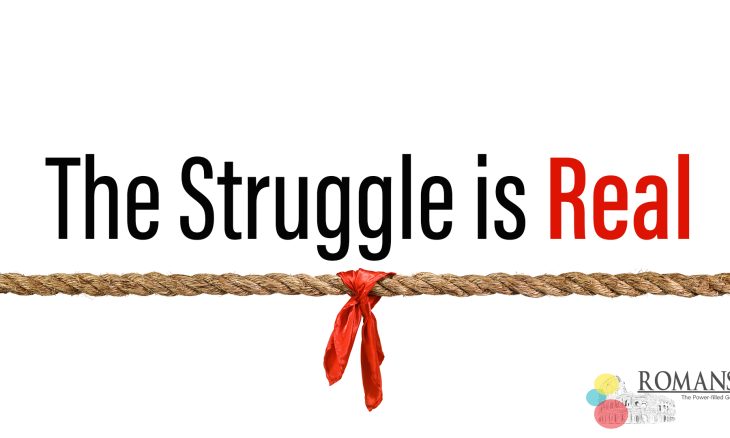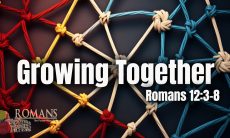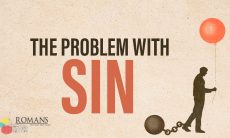The Frustration We All Know
- Ever promised yourself you wouldn’t do something again… and then did it anyway?
- Romans 7 speaks directly to this inner struggle. Paul describes the frustration of wanting to obey God but feeling pulled toward sin.
- Big Idea: The law shows us what’s wrong, but it can’t make us right. Only Jesus delivers us from this struggle.
I think. Paul’s account reminds me of a classic book I read many years ago by Robert Louis Stevenson called Doctor Jekyll and Mr. Hyde.
- They say the definition of a “classic book” is a book everybody’s heard of but nobody’s read.
- This is one that is worth reading, because it is inspired by the struggle
Paul describes in Romans 7.
In the story, this Dr. Jekyll, a fine, upstanding citizen, is frustrated
because it seems inside of him is a bad part and a good part, and the
bad part of him is always holding the good part of him back.
- He calls himself an “incongruous compound” of good and bad mixed together.
- So, Dr. Jekyll, being a chemist, develops this potion that separates
- the two parts of him so that the good part only comes out by day and
- the bad part only comes out at night.
- The good guy is Dr. Jekyll; the bad is “Mr. Hyde,” whose name derives from the word “hideous” or “hidden.” (So, he’s got only good and only bad, operating all by themselves.)
The problem was that the evil part of Dr. Jekyll was far more evil
than he had imagined. Mr. Hyde’s every thought was centered on
himself.
- He is spiteful, angry, vengeful and petty.
- He steals, lies, manipulates and even murders.
- Dr. Jekyll said, “I was tenfold more wicked than I ever thought.”
And Stevenson, speaking through Dr. Jekyll, explains, “I discovered
through this process that man is not truly one, but two… It wasn’t
that I was a hypocrite… both sides of me were completely sincere.”
That explanation probably resonates with a lot of us. Many of us feel
like we are an incongruous compound of completely opposite people.
Anybody relate? There’s a part of me that wants to do the right thing
and another part that doesn’t want to do it at all.
This chapter basically divides into 3 sections:
- vv. 1–6 give us an analogy that shows us how to make the
transition between two viewpoints of the battle we face.
- Vv. 7–13 describes a battle we can’t win;
- Vv. 14–25 describes a battle we can’t lose;
I. Released from the Impossible
Romans 7:1–6
Or do you not know, brothers—for I am speaking to those who know the law—that the law is binding on a person only as long as he lives? 2 For a married woman is bound by law to her husband while he lives, but if her husband dies she is released from the law of marriage.[b] 3 Accordingly, she will be called an adulteress if she lives with another man while her husband is alive. But if her husband dies, she is free from that law, and if she marries another man she is not an adulteress.
4 Likewise, my brothers, you also have died to the law through the body of Christ, so that you may belong to another, to him who has been raised from the dead, in order that we may bear fruit for God. 5 For while we were living in the flesh, our sinful passions, aroused by the law, were at work in our members to bear fruit for death. 6 But now we are released from the law, having died to that which held us captive, so that we serve in the new way of the Spirit and not in the old way of the written code.
Romans 7:4–6
“Therefore, my brothers and sisters, you also have died to the law through the body of Christ so that you may belong to another—to Him who was raised from the dead—in order that we might bear fruit for God.” (v.4)
Here’s Paul’s main point:
- Before we knew Christ, we were “married” to the law.
- The law—whatever standard we believed made us acceptable—controlled and defined us.
For some, that standard was religious: “I’m a good enough Christian, so I’m okay.”
For others, it was more secular: “I’m a good parent, a successful businessperson, a top student… and that gives me value and hope.”
Whatever the standard that life is gone and we have been raised to walk in a new life filled with the spirit and covered in Christ’s blood so that we stand before our heavenly father as dearly loved children.
Now, instead of being bound to the law, we are “married” to Christ, who rose from the dead. This new relationship with Him leads us to bear fruit that pleases God.
Paul explains further: When we lived under the power of sin, the law actually stirred up sinful desires, and those desires led to death. But now we’ve been set free from that old system.
We serve God in a new way—through the power of the Holy Spirit, who has already secured our acceptance in Christ.
II. A Battle We Can’t Win
Romans 7: 7–13
What shall we say, then? Is the law sinful? Certainly not! Nevertheless, I would not have known what sin was had it not been for the law. For I would not have known what coveting really was if the law had not said, “You shall not covet.”[a] 8 But sin, seizing the opportunity afforded by the commandment, produced in me every kind of coveting. For apart from the law, sin was dead. 9 Once I was alive apart from the law; but when the commandment came, sin sprang to life and I died. 10 I found that the very commandment that was intended to bring life actually brought death.11 For sin, seizing the opportunity afforded by the commandment, deceived me, and through the commandment put me to death. 12 So then, the law is holy, and the commandment is holy, righteous and good.
Did that which is good, then, become death to me? By no means! Nevertheless, in order that sin might be recognized as sin, it used what is good to bring about my death, so that through the commandment sin might become utterly sinful.
A. The law acts as a mirror
- It reveals what’s wrong (v. 7: “I would not have known what sin was except through the law”).
- But a mirror can’t clean your face—it just shows the dirt.
B. The deeper problem: sin in us
- Sin takes advantage of the law, awakening rebellion (v. 8).
- The law itself is “holy, righteous, and good” (v. 12), but by nature we twist it.
When Paul says in vs. 9 that “once I was alive apart from the law,”
Paul looked at himself as a pretty good person.
He looked at the Ten Commandments and thought, “I’m doing pretty well.
- I’ve never committed adultery.
- I don’t steal.
- I’ve never killed.
- I care for my parents.
- I don’t worship idols.
- I observe every Sabbath
- and tithe every dollar.
But then, something in the 10th commandment, “Thou shalt
not covet,” gripped him.
- Because that command has nothing to do with external obedience–it focus on the heart.
- Again, coveting means you are dissatisfied with what you have. You look enviously at what other people have and wish you had it.
And Paul started to realize that even with all his external conformity to the other commandments, his heart really broke this one.
- Why do we steal? We covet what someone else has.
- Why do you lie? Quite often it is to obtain something you want but can’t get with the truth—
- We exaggerate our accomplishments or cover over faults to gain approval.
- Or, we lie to obtain a position or an advantage that you want but couldn’t get with the truth.
- Coveting the things that you don’t have compels you to
- lie.
- Why commit adultery? You desire sex with someone God hasn’t given you Our spouse, or your singleness, isn’t enough–you covet this other person God hasn’t given you.
Paul recognized that he was guilty of the heart of sin–the root sin.
And then, here was the real twist:
Paul recognized that even his zeal in religion was fueled by covetousness.
- What made him zealous in religion was he wanted distinction, and respect, and status.
- So, what do you do when you realize that one of your primary motivators in religion was itself sinful? You feel like you’ve died!
- And that just made him more insecure with God, which made him even more fervent in trying to show that he was good,
Vs 13
Nevertheless, in order that sin might be recognized as sin, it used what is good to bring about my death, so that through the commandment sin might become utterly sinful.
III. The Battle Within: The Struggle of Two Natures
Paul in these verses subtly shifts the discussion from his pre-Christ
days to himself now, as a mature Christian and an Apostle–notice all
the present-tenses in these verses:
Romans 7:14–23
We know that the law is spiritual; but I am unspiritual, sold as a slave to sin. 15 I do not understand what I do. For what I want to do I do not do, but what I hate I do. 16 And if I do what I do not want to do, I agree that the law is good. 17 As it is, it is no longer I myself who do it, but it is sin living in me.18 For I know that good itself does not dwell in me, that is, in my sinful nature.[c] For I have the desire to do what is good, but I cannot carry it out.19 For I do not do the good I want to do, but the evil I do not want to do—this I keep on doing. 20 Now if I do what I do not want to do, it is no longer I who do it, but it is sin living in me that does it.
21 So I find this law at work: Although I want to do good, evil is right there with me. 22 For in my inner being I delight in God’s law; 23 but I see another law at work in me, waging war against the law of my mind and making me a prisoner of the law of sin at work within me.
A. Paul’s honest confession
- “I do not understand what I do. For what I want to do I do not do…” (v. 15).
- Even as a believer, Paul feels the pull of the sinful nature.
B. This is the normal Christian struggle
- We are in Christ but still live in a fallen body with sinful desires.
- The law alone can’t change the heart; we need the power of the Spirit.
McKayla and I rowing against the wind across the lake in Texas.
Like rowing a boat against a strong current, you can try hard, but you need a stronger power to move forward.
IV. A Battle We Can’t Lose
Romans 7:24–25
What a wretched man I am! Who will rescue me from this body that is subject to death? 25 Thanks be to God, who delivers me through Jesus Christ our Lord!
Paul’s words capture the tension every believer feels:
- “What a wretched man I am! Who will rescue me?” (v. 24)
- “Thanks be to God, who delivers me through Jesus Christ our Lord!” (v. 25)
This cry of desperation quickly turns into a shout of gratitude. Paul knows the battle is real, but the victory is already secure in Christ.
A. My sinful cravings are no longer the real “me”
I must remember that the sinful desires I still feel don’t define me anymore. That’s the old me—dead and buried. In Christ, I’ve been made new.
This truth matters because the struggle doesn’t immediately disappear when we come to faith. You may still fall into the same sins you hated before Christ. The temptation is to believe:
- “Nothing has changed. I’m the same failure I’ve always been.”
But that’s not true. The battle is real, but now it’s a battle you cannot lose. Those old desires no longer represent your true identity.
When you begin to believe this, you’ll notice a shift:
- “Why doesn’t this sin feel as satisfying as it used to?”
- Because it’s no longer who you are.
Paul reminds us, “In your innermost being, you delight in the law of God” (Romans 7:22).
Those old sinful habits are like Lazarus’ grave clothes—leftovers from a life that’s gone. They don’t fit anymore. A funeral director once told me that when a family didn’t provide a burial suit, the funeral home would give one—but it was only the front half. Imagine walking around in that! It’s awkward and out of place because that’s not how living people dress.
That’s exactly what sin looks like on a believer. It doesn’t belong. When temptation calls, remind yourself:
- “This isn’t me. This isn’t who I am in Christ.”
B. Confidence in the Most Discouraging Seasons
December 1941 was a dark time for England. The war was going badly. But after Pearl Harbor, Winston Churchill called President Roosevelt. Roosevelt assured him, “We are all in the same boat now.”
Churchill later wrote:
“No American will think it wrong of me to proclaim that hearing the U.S. was on our side was the greatest joy to me. England would live. Britain would live. The rest of the war was simply the proper application of overwhelming force. I went to bed and slept the sleep of the saved and the thankful.”
That phrase—“overwhelming force”—turned Churchill’s fear into hope.
In Christ, we have a far greater overwhelming force at work. His presence guarantees our ultimate victory even when the battle feels exhausting.
But let’s be honest: sometimes we look at our hearts and get discouraged.
- Why do I still struggle with self-control?
- Why does pride flare up so easily?
- Why does gossip come more naturally than grace?
- Why do my affections for God feel cold?
Sometimes it’s not just that we fail to do the right thing—we don’t even want to. Our “wanter” feels broken.
But here’s the hope: God hears even that desperate cry. “A broken and contrite heart, O God, you will not despise” (Psalm 51:17).
Deep down, we have chosen to seek Him. We want to change. We want to want Him more. That is the essence of repentance.
So like Paul, we cry out:
“What a wretched man I am! Who will rescue me from this body of death? Thanks be to God, who delivers me through Jesus Christ our Lord!” (Romans 7:24–25)
Even on our darkest days, we can sleep “the sleep of the saved and the thankful,” knowing the outcome is secure and Christ’s victory is ours.
Even though Christ’s victory is already secure, God doesn’t just instantly remove all our struggles. Why? Because our ongoing battle with sin serves a purpose. It keeps us dependent on Him. It deepens our gratitude for His grace. That’s the very truth Paul arrives at in the next verse.
C. The Struggle Deepens My Appreciation for Grace
Why doesn’t God simply remove all our struggles? Because the battle serves a purpose. It keeps us dependent on Him and deepens our gratitude for grace.
John Newton, who wrote Amazing Grace, once reflected on this late in life. At 83 years old, he said he was more aware of his weaknesses than ever before and more desperate for grace than ever before.
Growth in grace isn’t reaching a point where you don’t need it anymore. It’s becoming more aware that you need it every single day.
C.S. Lewis observed that God sometimes allows certain “smaller” sins to linger because if He removed them, we might become proud of our progress. And pride is far more dangerous.
So don’t lose heart. God knows what He’s doing in your struggle. He is using it to keep you close, to strip away self-reliance, and to increase your appreciation for the gospel.
Romans 8 will show how the Spirit empowers us to live in victory.
Where are you still trying to rescue yourself? Will you surrender that struggle to Christ’s power today?
Conclusion:
Paul’s cry at the end of Romans 7 is one we can all relate to: “What a wretched man I am! Who will rescue me from this body of death?” We know what it’s like to feel the battle within—to want to obey God but find ourselves pulled toward sin. We know the frustration of promising we’ll never do something again… only to do it again.
But Paul doesn’t leave us in despair. His next words change everything: “Thanks be to God, who delivers me through Jesus Christ our Lord!”
The law can show us our need, but it can’t make us right. Trying harder will only lead to exhaustion and shame. Our hope isn’t in our ability to win the battle on our own—it’s in Jesus, who has already won the victory for us. Because of Him, we are no longer defined by our failures. We are no longer “married” to the law. We belong to Christ.
So when the struggle feels overwhelming, you can remind yourself:
- This is not who I am anymore.
- Sin doesn’t have the final word.
- Jesus’ victory is my victory.
And that truth changes everything. It means even in the midst of the fight, you can live with joy and confidence. You can rest “the sleep of the saved and the thankful,” knowing the outcome has already been decided.
Romans 8 will tell us how the Spirit empowers us to walk in this victory, but for now, let this be your prayer:
“Lord, I can’t rescue myself. I need You. Thank You that in Christ, I am already free.”
Where are you still trying to rescue yourself?
- Where are you wearing the “grave clothes” of your old life?
- Today, surrender that struggle to Jesus.
- His grace is enough for your darkest day,
- and His victory is enough for your deepest defeat.
Small Group Questions:
- Do you tend to relate to God through rule-keeping or relationship?
- Where have you been frustrated by the “I want to, but I can’t” cycle of sin?
- What practical step can help you rely more on the Spirit than your own willpower this week?















